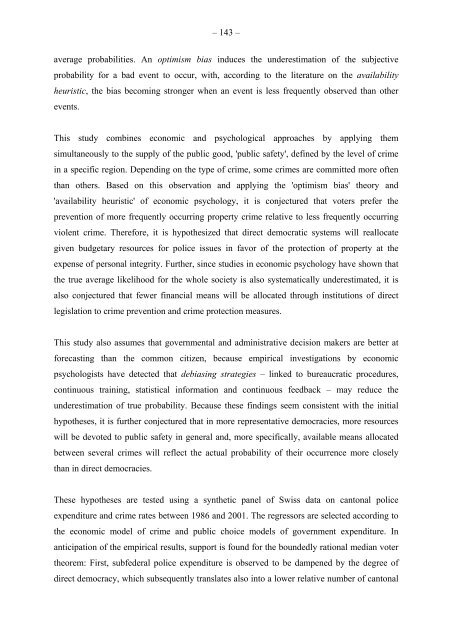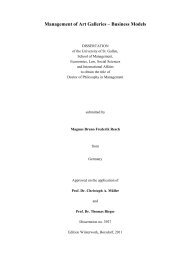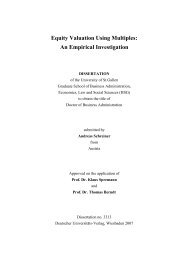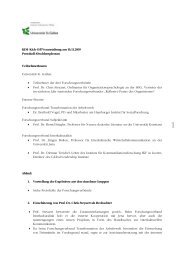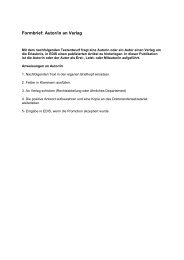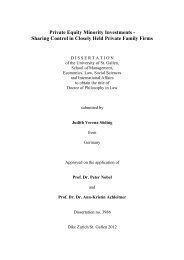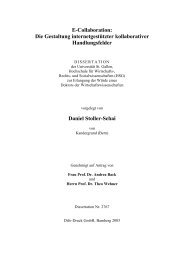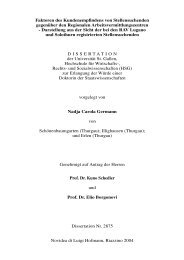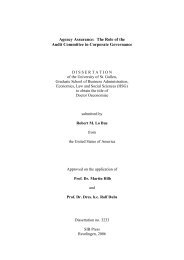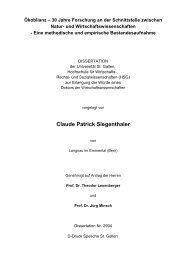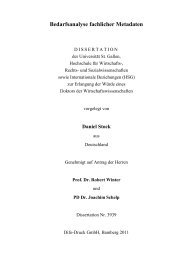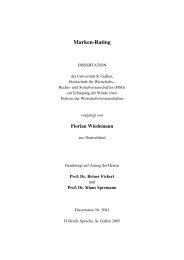The Impact of Direct Democracy on Society - Universität St.Gallen
The Impact of Direct Democracy on Society - Universität St.Gallen
The Impact of Direct Democracy on Society - Universität St.Gallen
- No tags were found...
You also want an ePaper? Increase the reach of your titles
YUMPU automatically turns print PDFs into web optimized ePapers that Google loves.
– 143 –average probabilities. An optimism bias induces the underestimati<strong>on</strong> <str<strong>on</strong>g>of</str<strong>on</strong>g> the subjectiveprobability for a bad event to occur, with, according to the literature <strong>on</strong> the availabilityheuristic, the bias becoming str<strong>on</strong>ger when an event is less frequently observed than otherevents.This study combines ec<strong>on</strong>omic and psychological approaches by applying themsimultaneously to the supply <str<strong>on</strong>g>of</str<strong>on</strong>g> the public good, 'public safety', defined by the level <str<strong>on</strong>g>of</str<strong>on</strong>g> crimein a specific regi<strong>on</strong>. Depending <strong>on</strong> the type <str<strong>on</strong>g>of</str<strong>on</strong>g> crime, some crimes are committed more <str<strong>on</strong>g>of</str<strong>on</strong>g>tenthan others. Based <strong>on</strong> this observati<strong>on</strong> and applying the 'optimism bias' theory and'availability heuristic' <str<strong>on</strong>g>of</str<strong>on</strong>g> ec<strong>on</strong>omic psychology, it is c<strong>on</strong>jectured that voters prefer thepreventi<strong>on</strong> <str<strong>on</strong>g>of</str<strong>on</strong>g> more frequently occurring property crime relative to less frequently occurringviolent crime. <str<strong>on</strong>g>The</str<strong>on</strong>g>refore, it is hypothesized that direct democratic systems will reallocategiven budgetary resources for police issues in favor <str<strong>on</strong>g>of</str<strong>on</strong>g> the protecti<strong>on</strong> <str<strong>on</strong>g>of</str<strong>on</strong>g> property at theexpense <str<strong>on</strong>g>of</str<strong>on</strong>g> pers<strong>on</strong>al integrity. Further, since studies in ec<strong>on</strong>omic psychology have shown thatthe true average likelihood for the whole society is also systematically underestimated, it isalso c<strong>on</strong>jectured that fewer financial means will be allocated through instituti<strong>on</strong>s <str<strong>on</strong>g>of</str<strong>on</strong>g> directlegislati<strong>on</strong> to crime preventi<strong>on</strong> and crime protecti<strong>on</strong> measures.This study also assumes that governmental and administrative decisi<strong>on</strong> makers are better atforecasting than the comm<strong>on</strong> citizen, because empirical investigati<strong>on</strong>s by ec<strong>on</strong>omicpsychologists have detected that debiasing strategies – linked to bureaucratic procedures,c<strong>on</strong>tinuous training, statistical informati<strong>on</strong> and c<strong>on</strong>tinuous feedback – may reduce theunderestimati<strong>on</strong> <str<strong>on</strong>g>of</str<strong>on</strong>g> true probability. Because these findings seem c<strong>on</strong>sistent with the initialhypotheses, it is further c<strong>on</strong>jectured that in more representative democracies, more resourceswill be devoted to public safety in general and, more specifically, available means allocatedbetween several crimes will reflect the actual probability <str<strong>on</strong>g>of</str<strong>on</strong>g> their occurrence more closelythan in direct democracies.<str<strong>on</strong>g>The</str<strong>on</strong>g>se hypotheses are tested using a synthetic panel <str<strong>on</strong>g>of</str<strong>on</strong>g> Swiss data <strong>on</strong> cant<strong>on</strong>al policeexpenditure and crime rates between 1986 and 2001. <str<strong>on</strong>g>The</str<strong>on</strong>g> regressors are selected according tothe ec<strong>on</strong>omic model <str<strong>on</strong>g>of</str<strong>on</strong>g> crime and public choice models <str<strong>on</strong>g>of</str<strong>on</strong>g> government expenditure. Inanticipati<strong>on</strong> <str<strong>on</strong>g>of</str<strong>on</strong>g> the empirical results, support is found for the boundedly rati<strong>on</strong>al median votertheorem: First, subfederal police expenditure is observed to be dampened by the degree <str<strong>on</strong>g>of</str<strong>on</strong>g>direct democracy, which subsequently translates also into a lower relative number <str<strong>on</strong>g>of</str<strong>on</strong>g> cant<strong>on</strong>al


